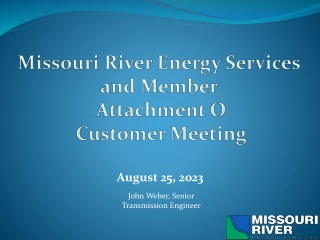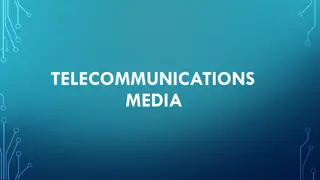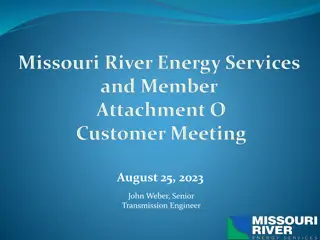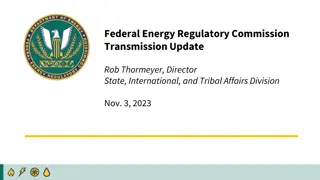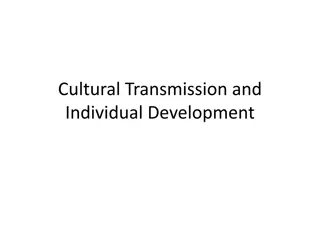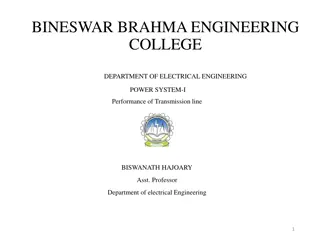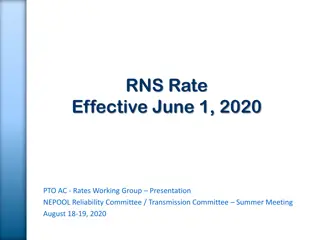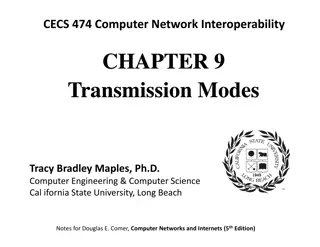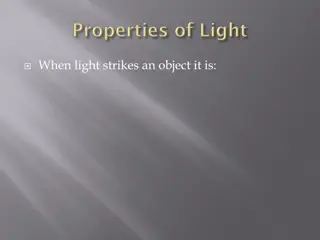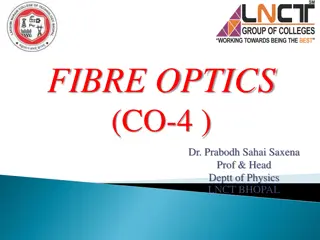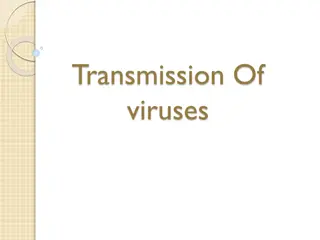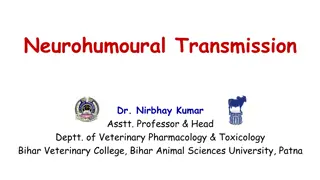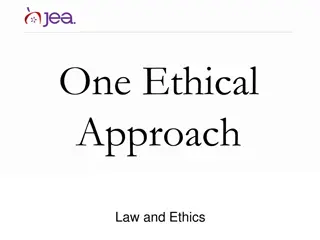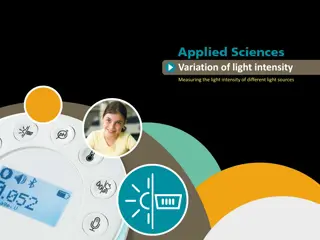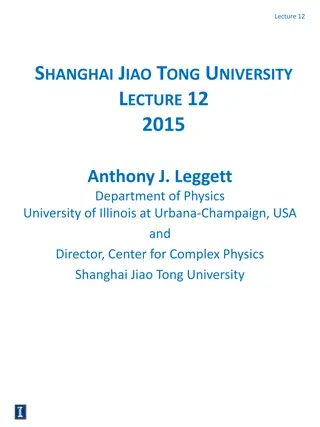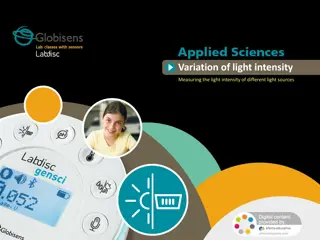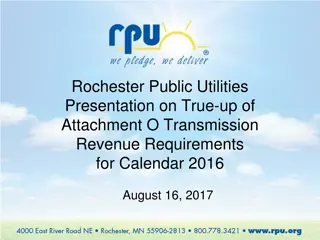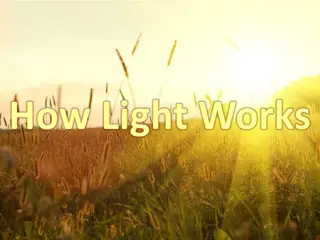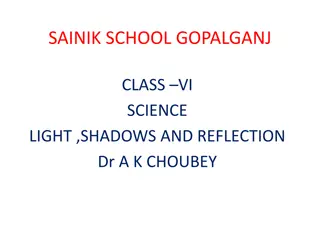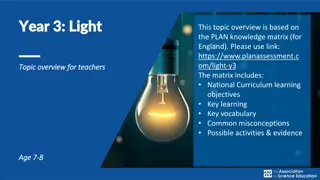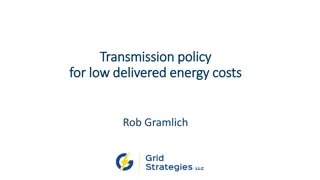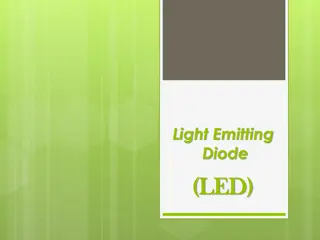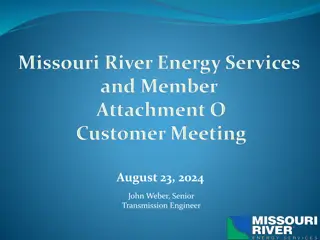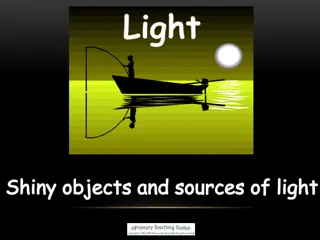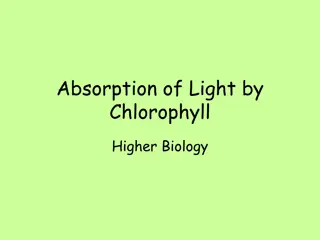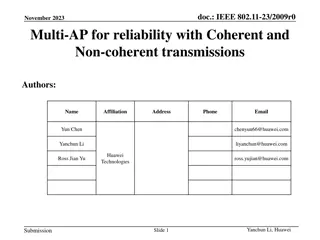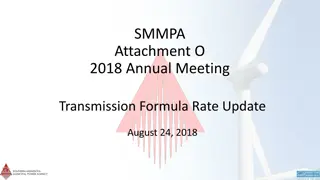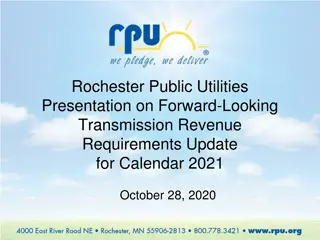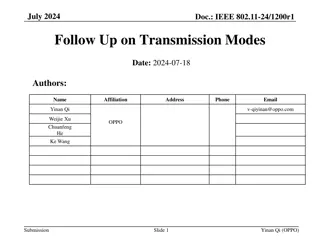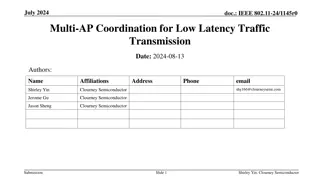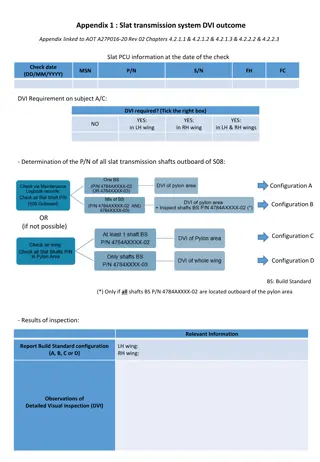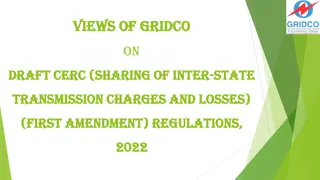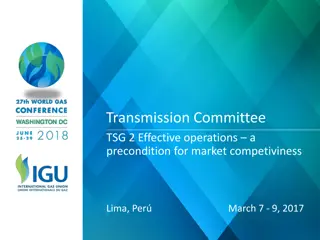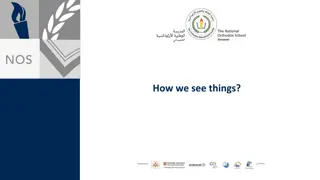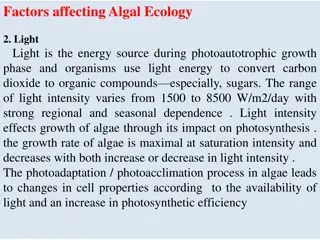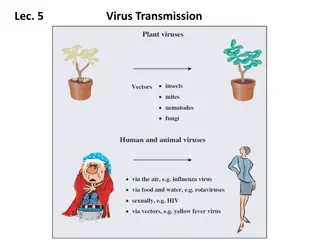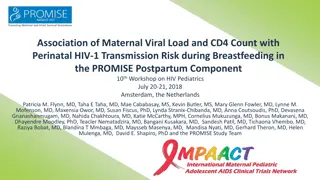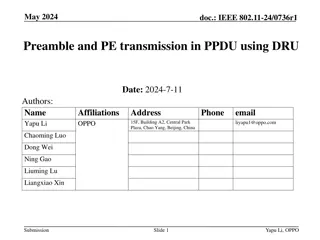MRES Transmission Update: Projects, Rates, and Regulatory Changes - August 25, 2023
Explore the latest updates on MRES transmission projects, rate adjustments, and regulatory developments discussed during the meeting on August 25, 2023. Details include MRES member rate information, specific rate adjustments for MMU and WMU, transmission project energization, true-up information, an
1 views • 15 slides
TELECOMMUNICATIONS MEDIA
Telecommunications is the electronic transmission of information over distances, including voice calls, data, text, images, and video. It encompasses a range of technologies like fiber optics, satellites, telephones, and the Internet. Components of a telecommunications network include terminals, int
5 views • 13 slides
MRES Transmission Project Updates and Regulatory Overview
John Weber, Senior Transmission Engineer, presents key updates on MRES transmission projects, including the energization of the Lorain Substation and recent restoration efforts post-tornado strike at Elbow Lake Substation. The meeting agenda covers MRES member rate information, regulatory changes, a
1 views • 15 slides
Federal Energy Regulatory Commission Transmission Update - Nov. 3, 2023
FERC, led by Director Rob Thormeyer, regulates natural gas wholesale facilities, interstate pipelines, onshore LNG facilities, wholesale electric market rates, and more. The Commission consists of five appointed Commissioners overseeing key initiatives like transmission planning proposals and interc
0 views • 14 slides
Understanding Cultural Transmission and Individual Development
Cultural transmission plays a crucial role in perpetuating features across generations through processes like enculturation and socialization. It involves the transmission of values, beliefs, and skills from parents and peers, shaping individual development. The interaction between biological and cu
1 views • 40 slides
Understanding Performance of Transmission Lines in Electrical Engineering
The performance of a transmission line in power systems is critical for efficient operation. Factors such as voltage drop, line losses, and transmission efficiency are key considerations in design and operation. The line parameters of resistance, inductance, capacitance, and shunt conductance play c
2 views • 26 slides
Transmission Rate Change Overview for June 1, 2020
Presentation on the Rate Change effective June 1, 2020, detailing RNS Rate adjustments, Annual Transmission Revenue Requirements, and Regional Forecasts. The RNS Rate increased to $129.26/kW-year reflecting transmission project impacts, while ATRR analysis showed changes in revenue requirements for
0 views • 25 slides
Understanding Transmission Modes in Computer Networks
Transmission modes in computer networks can be divided into serial and parallel modes. Parallel transmission allows multiple bits to be sent simultaneously over separate media, while serial transmission sends one bit at a time. The choice between serial and parallel transmission depends on factors s
0 views • 13 slides
IEEE 802.11-21/1737r0 Beacon and Group Frames Information
This document discusses the transmission of Beacon and group addressed frames in IEEE 802.11 networks, focusing on the impact of frame types and MCS on BSS range and transmission rate. It proposes out-of-band signaling to assist scanning STAs in determining BSS range and non-AP MLDs in selecting a l
0 views • 14 slides
Understanding the Interaction of Light with Objects
When light strikes an object, it can be reflected, transmitted, or absorbed, depending on the material of the object. Transparent materials allow light to pass through, translucent materials scatter light, and opaque materials absorb and reflect light. The color of objects is the color they reflect,
6 views • 17 slides
Overview of Optical Fibre Technology and Applications
Optical fibre technology, spearheaded by Dr. Prabodh Sahai Saxena, revolutionizes communication systems through light transmission. This cutting-edge technology utilizes fibre optics made of glass or plastic to carry light signals, offering advantages like high bandwidth, low signal loss, and no ele
0 views • 20 slides
Understanding the Transmission of Viruses: Routes and Implications
Viruses are intracellular parasites that require transmission to a new host to evade immune responses. This transmission process, whether through respiratory droplets, fecal-oral routes, or sexual contact, is crucial in the viral life cycle. Different modes of transmission, such as horizontal and ve
0 views • 11 slides
Understanding Neurohumoural Transmission in Veterinary Pharmacology
Neurohumoural transmission in the field of veterinary pharmacology involves the communication of nerve messages through the release of chemical messengers. This process includes axonal conduction and junctional transmission. The historical aspects of neurohumoural transmission highlight key discover
5 views • 11 slides
Ethical Approaches in Journalism: Red Light vs. Green Light Ethics
Explore the contrasting perspectives of Red Light and Green Light ethics in journalism, where Red Light focuses on caution and restraint while Green Light emphasizes action and opportunity. Dive into the nuances of ethical decision-making in journalism and consider the impact of language on ethical
0 views • 13 slides
Understanding Light Intensity Variation in Different Sources
Explore the correlation between light intensity and efficiency in various light sources through an intriguing experiment. Delve into the theoretical framework and practical applications to grasp the essence of light intensity and its distribution. Uncover the factors influencing the efficiency of li
0 views • 21 slides
Superconductivity and Electrical Transmission Losses: Exploring Potential Solutions
The lecture delves into the factors controlling electrical transmission losses, highlighting how using superconductors could lead to zero transmission loss. However, the challenge lies in the low critical temperature (Tc) of most materials. Despite the discovery of superconductivity in 1911, practic
2 views • 9 slides
Understanding Light Intensity: Measuring Different Light Sources
Explore the concept of light intensity by measuring various light sources and their efficiency. Through practical experiments, understand the relationship between light intensity and the output of different light sources. Theoretical frameworks, practical applications, and key concepts are discussed
0 views • 21 slides
Rochester Public Utilities Presentation on True-up of Attachment O Transmission Revenue Requirements
Rochester Public Utilities (RPU) holds annual meetings to discuss and provide information on the calculation of the True-up of RPU's 2016 Annual Transmission Revenue Requirements. The presentation also covers the True-up Adjustment applied to the 2018 Forward-Looking Rate. RPU uses a FERC-approved F
0 views • 14 slides
Understanding Light: Basic Properties and Interactions
Explore the fundamental properties of light such as its speed compared to sound, the formation of shadows, and how we see things through reflection. Dive into types of light interactions like refraction and reflection, understanding how light behaves when passing through different mediums and intera
0 views • 27 slides
Understanding Light, Shadows, and Reflection in Science
Light is a vital form of energy that helps us see objects. Luminous objects emit light, while non-luminous objects do not. Understanding how light interacts with objects, creating shadows and reflections, is crucial in science. Transparent objects allow light to pass through, translucent objects all
0 views • 13 slides
Understanding Light: Key Concepts for Year 3 Students
Delve into the world of light with Year 3 students through engaging activities and explorations. Learn about sources of light, shadows, reflective surfaces, and the importance of light for vision. Discover how light helps us see and how shadows are formed, while exploring materials and objects that
0 views • 9 slides
Enhancing Transmission Infrastructure for Reliable and Efficient Energy Delivery
Interregional transmission plays a crucial role in ensuring energy reliability and cost efficiency, especially during extreme weather events. Connecting areas with diverse net load reduces costs and enables significant power transfers. Investing in bigger transmission lines leads to lower losses and
0 views • 9 slides
Understanding Light Emitting Diodes (LEDs)
Light Emitting Diodes (LEDs) are semiconductor devices that convert electrical energy into visible or invisible light. They are constructed using gallium, phosphorus, and arsenic materials instead of silicon or germanium. The recombination process in forward bias condition is crucial for the operati
0 views • 19 slides
Understanding Color: A Comprehensive Overview
Color is a fascinating aspect of our visual world, explored through the prism of science and light. This chapter delves into the origins of color perception, from Isaac Newton's study of the color spectrum to the reflection and transmission of light that determines how we see colors. Gain insights i
0 views • 28 slides
Transmission Engineer Meeting Summary - August 23, 2024
John Weber, Senior Transmission Engineer, led a meeting discussing MRES true-up for 2023 historical rate information, regulatory changes, and transmission projects. The meeting covered MRES member rate information and highlighted MRES transmission facilities, FERC background, and recent projects inc
0 views • 15 slides
Understanding Sources of Light and Reflection
Exploring the concept of light sources and reflection, the article delves into how light is created by various objects like the sun, light bulbs, and fires. It explains the difference between sources of light and objects that reflect light, such as shiny metal surfaces. The reader is encouraged to i
0 views • 14 slides
Understanding Light Absorption by Chlorophyll in Biology
Explore how chlorophyll absorbs light in photosynthesis, the role of different types of seaweeds, and the use of spectrometers to measure light absorption. Discover the specific light regions absorbed by chlorophyll A and B, as well as adaptations in seaweeds for varying light intensities. Learn abo
0 views • 9 slides
Multi-AP for Reliable Wireless Transmission with Coherent and Non-coherent Technology
In this IEEE 802.11-23/2009r0 document, the concept of Multi-AP coordination is discussed to achieve Ultra High-reliability (UHR) goals. The use of both Coherent Joint Transmission (JT) and Non-coherent transmission technologies is explored for improved reliability and performance in wireless commun
0 views • 16 slides
SMMPA Annual Meeting Transmission Rate Update 2018
SMMPA, a not-for-profit political subdivision in Minnesota, updated its transmission rate formula in August 2018. The Attachment O timeline outlines crucial dates for stakeholders, including the annual meeting on formula rate updates. SMMPA, as a Transmission Owner in MISO, follows FERC-approved tem
0 views • 8 slides
Rochester Public Utilities - Forward-Looking Transmission Revenue Update
Rochester Public Utilities (RPU) presents an update on the forward-looking transmission revenue requirements for calendar year 2021. The presentation covers the regulatory background, rate calculations, and adjustments for the upcoming year. Key topics include the FERC-approved formula rate, true-up
0 views • 13 slides
Recap of IEEE 802.11-24/1200r1 - July 2024 Transmission Modes
This contribution discusses the harmonized waveform design and various transmission modes for active UL transmission in IEEE 802.11-24/1200r1 document. It presents multiple proposed solutions, waveform types, feasibility, and benefits of active UL transmission. The aim is to achieve optimal design c
0 views • 8 slides
Multi-AP Coordination for Low Latency Traffic Transmission
The document discusses the integration of multi-access point (AP) coordination to enhance the transmission of low-latency traffic in wireless networks. It addresses the challenges and introduces modes of operation capable of reducing latency and improving reliability for low-latency (LL) traffic tra
0 views • 9 slides
Aircraft Transmission System Check Appendices
Collection of appendices linked to aircraft transmission system checks including slat transmission system outcomes, typical transmission shaft damages, TSU condition check values recording, and assessment flowchart.
0 views • 4 slides
Proposed Amendments to GRIDCO Regulations for Transmission Charges
The proposed amendments to the CERC regulations aim to alleviate the burden of transmission charges on GRIDCO and consumers in Odisha. The amendments focus on the sharing of inter-state transmission charges and losses, including the substitution of LTA/MTOA with GNA for sharing transmission charges.
0 views • 7 slides
Transmission Committee TSG-2 Effective Operations & Market Competitiveness Conference
The Transmission Committee TSG-2 Conference held in Lima discussed the effective operations as a prerequisite for market competitiveness in the gas transmission industry. Key topics included safety, environmental performance, and asset management for gas transmission systems. Participants from vario
0 views • 13 slides
Understanding Light: How We See and Interact with Objects
Explore the fascinating world of light and vision, from how light travels in straight lines to how we perceive objects. Learn about luminous and nonluminous objects, the different categories of light sources, and the vocabulary associated with light interactions. Delve into the concepts of emitting,
0 views • 7 slides
Factors Affecting Algal Ecology: Light Intensity Impacts on Algae Growth and Composition
Light intensity plays a crucial role in the growth and composition of algae. Algae undergo photoadaptation processes to adjust to varying light levels, affecting their photosynthetic efficiency and cellular properties. High light intensity can lead to photoinhibition and changes in cellular composit
0 views • 19 slides
Understanding Virus Transmission via Vectors
Viruses must be transmitted to new hosts for their survival. This transmission occurs through vectors like arthropods, which acquire and transmit viruses during feeding. The mechanism involves viruses attaching to the vectors' mouthparts or entering their circulatory system to reach salivary glands
0 views • 14 slides
Association of Maternal Viral Load and CD4 Count with Perinatal HIV-1 Transmission Risk
Increased maternal viral load (MVL) and decreased CD4 cell counts have been linked to higher risks of perinatal and postnatal HIV-1 transmission during breastfeeding. The PROMISE Postpartum Component study examines the association between these factors and transmission risk, providing insights into
0 views • 15 slides
Preamble and PE Transmission in PPDU Using DRU
The document discusses the transmission of Preamble and Physical End with the DRU technology in PPDU for IEEE 802.11 networks. It covers various aspects such as legacy preamble, UHR-STF, UHR-LTF, PE fields, and SIG transmission. The focus is on achieving compatibility and performance efficiency in D
0 views • 13 slides
